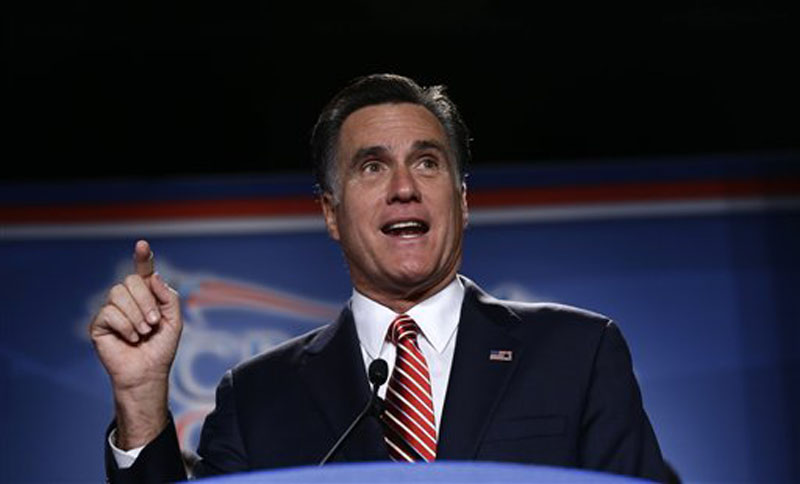WASHINGTON — Republican presidential nominee Mitt Romney is shifting sharply to the political center as he begins to deliver a closing argument aimed at a slice of moderate, undecided voters a month before Election Day.
On taxes, immigration and more, the former Massachusetts governor has toned down his heated, campaign trail rhetoric this week, including during his strong debate performance Wednesday night, as he looks to gain ground against President Barack Obama in the handful of states that will determine the outcome of the competitive race.
“I know this is going to be a close-fought battle,” a jubilant and invigorated Romney said in Colorado before he flew to Virginia for an evening rally with running mate Paul Ryan.
In the coming days, the Republican nominee will try to capitalize on his well-received appearance by moderating his pitch and working to narrow Obama’s advantage in swing-state polling that aides say showed signs of tightening even before Romney and the president sparred. The Republican’s aides played down the notion that the debate was a game-changing event. But they appeared more optimistic about Romney’s chances than they had been during a troubled stretch that lasted several weeks.
“We’ve got over a month here,” Romney strategist Stuart Stevens said. “That’s an eternity.”
Romney will use that time to drive the centrist message he outlined in the debate. He emphasized support for popular elements of Obama’s health care plan, embraced government regulation as necessary and hinted that he may eliminate government subsidies for oil companies as part of a larger tax plan he insisted would not cut taxes for the wealthy.
In some cases, the message is a dramatic departure — in tone, if not substance — from a candidate who has for more than a year assailed the president’s “government takeover” of health care and “job-crushing regulations,” and who has promised tax cuts for all.
While moderating his message, Romney will also deliver a series of policy speeches, beginning with a foreign policy address in Virginia on Monday, to help crystalize differences with the Democratic incumbent. Future speeches are expected to focus on job creation and federal debt — areas where Romney’s internal polling suggests there is an opportunity to win over so-called “persuadable voters.”
A recent Associated Press-GfK poll found that the vast majority of voters already have settled on a candidate, but 17 percent of likely voters are considered persuadable — either because they’re undecided or showing soft support for Obama or Romney. The group is generally less informed than the average voter and more moderate politically. Roughly 56 percent of persuadables approve of the way Obama is handling his job as president, but fewer, 47 percent, approve of his handling of the economy.
Starting Thursday night, Romney also planned to lean more heavily on Ryan, the Wisconsin congressman, to help connect with voters. While Romney’s campaign can cover more ground if they hold separate events, the two typically draw larger crowds when they appear together and Romney tends to be more energized with his No. 2 alongside him.
As he headed to Virginia on Thursday, Romney was more upbeat than he had been in weeks. He grinned widely as he laughed and talked with aides at the front of his campaign plane. The atmosphere among his staff and advisers on the plane was jovial.
Obama’s campaign wasted little time trying to dampen the mood, with David Axelrod, the president’s campaign strategist, saying: “It was a very vigorous performance, but one that was devoid of honesty.” ”…. I don’t think he helped himself last night with his serial evasions and deceptions.”
To a certain extent, there’s a fissure between Romney’s message on the campaign trail and in television advertising.
He declared in the debate, for example, that government regulation “is essential.” Asked whether he thought it was excessive under Obama’s leadership, Romney told a Denver audience a day later: “In some places, yes. Other places, no.”
But Romney is running an ad on Colorado television on the same topic that says: “Excessive government regulations are crushing job creation.”
On health care, Romney said in the debate that “pre-existing conditions are covered in my plan,” a reference to the popular provision in the president’s health care overhaul that prevents insurance companies from denying coverage to certain people.
But in recent months, the Romney campaign has repeatedly clarified that only those who maintain continuous health care coverage would be protected.
And while immigration was not addressed in the debate, Romney earlier in the week told The Denver Post that he would honor temporary work permits for young illegal immigrants granted by the Obama administration.
Throughout the Republican primary, however, Romney took an aggressive tack on immigration, saying in debates that he approved of “self-deportation,” where illegal immigrants would choose to leave on their own because they couldn’t find work in the U.S. He assailed rival Rick Perry, the Texas governor, for allowing illegal immigrants to attend Texas state colleges and universities at reduced, in-state tuition rates.
Send questions/comments to the editors.



Comments are no longer available on this story